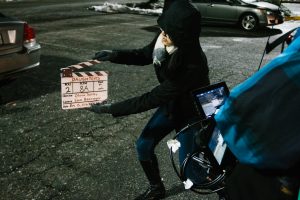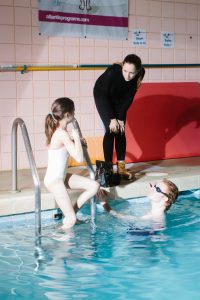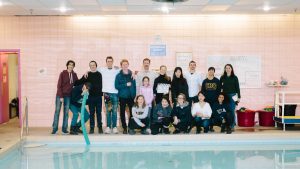
Olivia Sorley, a third year Film Production student here at UBC’s Film Production Program, recently directed her first short film, Daughters. It will be premiering at POV 27 on April 29 and 30, 2017.
Having been into video making since she was eleven years old, Olivia has primarily worked as a film editor, that being her primary interest. Born in Singapore but raised in Victoria before moving to Vancouver, she recently decided to have a hand at directing her own short film as a way to gain a deeper perspective into the filmmaking process. I recently sat down with her at Lost + Found cafe for a brief conversation about her film and filmmaking process.
In your music videos, you edit to the beats of the music. Is there a specific approach you take when it comes to editing?
When it comes to music videos, for sure, always cut on the beat, it’s the way I like to work, but now I only just started getting into narratives, and finding it so hard to find that moment, it kinda comes naturally, kinda getting used to it.
Just finding the rhythm and the beat, I suppose. Is there any specific editors that inspire you, perhaps?
Not really, there isn’t really an editor that comes to mind, that I’m like “this is my favorite editor” but like, favorite directors, like I love Sofia Coppola, PT Anderson, but I’m a horible editor in that way, like “this is my inspiration in editing”. I’ll get there. (1:45)
Yeah, it’s hard to find a specific and unique traits in film editing, you really have to pay attention.
Lately I’ve been really into this Japanese director Takeshi Kitano, and he also edits his own movies, I was watching some behind the scenes footage of him in the editing room, and he counts like, every second of every scene. He would go “1, 2, 3, cut! Cut at 3 seconds! Cut at 4 seconds! Next scene 5!
Oh really?
Its pretty crazy, as he would build up the scenes longer and longer then shorter and shorter…and he utilizes a lot of long takes as well
Ah…classic, its funny because usually when I’m editing, I love long takes, I love lack of cutting, which is funny because I should like more cutting things because I’m an editor but…
Oh yeah if you get long takes right, oh wow…is there any specific long takes that comes to mind?
I really like the intro to Boogie Nights, its my favourite, pretty much any of PT Anderson’s long takes, he’s just, like, figured it out.
Considering your interest in editing, what prompted you into trying out directing?
It was actually last year, we had to, uhm, I got an email about an Oscar winning editor coming to town, and that’s my life goal, and I was like “I should go see him” and ask him questions and check him out. So I went to this speech, and he said if you’re a good editor you’ll make a good director and and if you’re a good director you’ll make a good editor. So in that case I wanted to try directing and get a deeper understanding as an editor, if I give directing a shot, and see what that’s like, and that would probably improve my editing if i try directing a little bit. I wrote the script, and I pushed it, and I really, really wanted to get it, I was really lucky and it was really hard, it was fun.
Is there any correlation between being in the editing room to being on set directing?
I definitely found that, with all the experience I had editing, in set I was definitely, every single shot that we planned out, I was piecing it together in my head as we were doing it, so as we were filming, I felt like this was going to make sense. Even though this isn’t in the shot we need to add this to make sense. I found that really, really beneficial.
This is your first short film, too, isn’t it?
Yeah, it is!
Can you, then, tell us a bit about your film, Daughters?
Sure! Its about Leonard, who is a middle aged man, and he goes to visit the community swimming pool. He’s kinda there, watching the little girls swimming, and he’s given the opportunity to take one of them home. He sorts of struggles internally with that. He contemplates maybe taking her somewhere else that isn’t home.
Oh jeez.
(laughs) Its very dark. Yeah, I sort of wrote it, I end up writing it as it was a story about a nasty pedophile. I looked at it and thought that “this isn’t anything new” I feel like, why don’t I take this from a different perspective, try to empathize with the character that people usually, you know, the villain, why don’t I write the script with this person as the protagonist. Its not about their goal of being, like, sexually satisfied, but about the struggle of these urges. Its something that not a lot of people talk about, people that don’t have any resources to deal with that, so sometimes, they might pursue these interests. So I kinda just wanna make this film to bring attention to the fact that this is something that people struggle with, they don’t want to struggle with it, they don’t actually want to do anything, but they need some sort of help, essentially. That’s why I wrote it.

Olivia directing her lead actress on the set of Daughters.
Wow, sounds like one of these films that toys with audience’s emotions.
Yeah, that’s kinda what I was trying to do, play with their expectations and play with what they’re used to feeling towards that sort of character, and make them think about it from a different perspective.
What inspired you to make the film?
My initial inspiration for the film was just the location, I really wanted to film something at a swimming pool, and so, I started with that, and everything else came later, but as I sort of wrote it, as I researched this things, pedophelia, this was something that I kinda wanna talk about and bring attention to.
On set, since you’re still quite new to directing, is any challenges that you faced?
(laughs) Yeah, quite a lot.
Any on set stories, perhaps?
I think the thing I struggled with the most was realizing my role, going into it, “I’m a director, my job is to direct everybody, keep everybody in line. I realized that, a day in, that not all of that is my worry, I was really stressed about time, I was really stressed about keeping my crew happy, and I sort of realized that that’s not necessarily my job, there are people for that, so I was getting really really stressed on set trying to get the performances I want, but also stressing about having enough time for everything to do everyday, so after I realized that it wasn’t my job, things got a lot easier. I realized that I got my first AD to deal with things like that, so it was all just discovering my role as a director is definitely the biggest challenge.
Well, how long did the whole film take to make?
Well I wrote it a year ago, and then pre-production took about 3 months of perfecting the script and storyboarding, and shooting was 3 days, and then editing, 4 months, we’re still in editing, we’re doing sound design now. There’s so much more that people don’t think about, that comes up.
Do you have a composer for this? Is there a specific score?
I actually composed a little score for it, we didn’t hire anybody. I have someone helping with sound designing, but I’m also sound designing and sound mixing and editing.
You have a lot on your plate.
(laughs) I do, no one can say that this isn’t my movie.
What parts of your personal life do you bring into your art?
Oh wow, that’s a good question. I guess when I was writing the script, there’s a young female character, she’s around 11, and I based a lot of things in her life on my own life, because I was once an 11 year old girl at a swimming pool, so I found it a lot easier to sort of create a realistic sort of life for her, as of picturing it as sort of my own, just little things, like her address was my address as a little kid, giving these little itty bitty details, I left them somewhere in real life, made it a lot easier to make a believable story.
Well, I suppose we can go into the next question of how your photography correlate with your filmmaking process, is there a specific style to both?
You know, not too much in term of visuals, my director of photography, Sam, was in charge of the visuals, and he did a great job, I couldn’t have done it without him. I actually started taking pictures of models about a year ago, doing portrait photography, as like as a form of, getting used to that sort of directing, I started it because I knew I was gonna start directingand I wanted to sort of ease into it by directing models and understanding that sort of relationships that come from behind the camera and being in front of the camera. I learned a lot from it, I learned about like, developing comfort between model, director, actor, director, I found that really, really helpful.
Yeah, you gotta really just force yourself in there, to get to know people.
Yeah, its nervewracking being in front of a camera sometimes, you have to like, get to know them, and make sure that they’re comfortable, and become aware if they’re not comfortable and learn to make them at home, and so, it was a useful thing to do.
I personally have a list of movies, and have written some notes about them, it’s a list of films that inspire me, because I want to get into film production as well. I make note of specific scenes that catches my attention. Is there any specific films or an specific scenes that made you go like “that’s the kind of movie I wanna make”?
Right, that is a good question.
When you’re directing, and you visualize how the film’s gonna go, do you visualize specific aspects that you wanna take from movies, perhaps?
With Daughters I didn’t really take any inspiration from films. The one thing that I was sort of inspired by, I saw a video essay, by Every Frame a Painting, it was talking about left to right, right to left, it was talking about how in scenes where there are positive hope the characters are usually moving from left to right and when there’s negative they go from right to left. Its talking about this pattern. So as I was about to start storyboarding, I was like “I’m gonna do that! I;m gonna have some subtleties!” There is this one scene where he is driving in the frame, he is going right to left, and then he decides not to take the little girl home, he goes from left to right. But it didn’t make the final cut!
That’s unfortunate!
I have all these ideas that didn’t make the final cut. Things come up that you haven’t planned at all, while you’re in the storyboarding in the pre-production phase, you’re like, “oh man, this is gonna look like this! This is gonna look like this, its gonna be great etc.” Then in the post-production stage you’re like “No, that’s all gone! But we can do this, like, something else, that idea.”

The cast and crew of Daughters.
Daughters will be screening at the Frederic Wood Theatre at UBC on April 29 and 30 at 7pm. For tickets, visit http://ubcpovfilmfestival.rezgo.com/details/121517/pov-27
 Follow
Follow